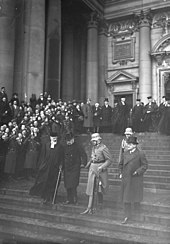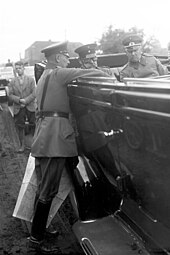Oskar von Hindenburg
Oskar Wilhelm Robert Paul Ludwig Hellmuth von Beneckendorff and von Hindenburg (born January 31, 1883 in Königsberg , Prussia , † February 12, 1960 in Bad Harzburg ) was a German lieutenant general and son of President Paul von Hindenburg . Oskar von Hindenburg became publicly known primarily through his influence on his father in connection with the lifting of the SA ban in 1932 and Hitler's appointment as Reich Chancellor in January 1933.
biography
Oskar von Hindenburg was born on January 31, 1883 as the only son of Paul von Hindenburg. He had two sisters, Irmengard Pauline (1880–1948, married von Brockhusen ) and Annemarie (1891–1978). In 1921 he married the daughter of the landowner Margarete von Marenholtz (1897–1988), with whom he had four children, including Hubertus, who was born in 1928 and died in 2016.
Military career

From 1903 he was a lieutenant officer in the 3rd Guards Regiment and was later appointed battalion adjutant . As a general staff officer at the Army High Command and with the staff of the 20th Infantry Division with the rank of captain (since 1914), he took part in the First World War. After the end of the war he was accepted into the Reichswehr and on April 1, 1922 company commander in the 16th Infantry Regiment . After his promotion to major on April 1, 1923, he was employed as a tactics teacher at the cavalry school in Hanover from October .
From May 1, 1925, he acted as an adjutant to his father, the Reich President. While maintaining this position, he was assigned to the staff of Group Command 1 on October 1, 1925 . In the following years he was on February 1, 1929 Lieutenant Colonel and on February 1, 1932 Colonel promoted. On August 3, 1934, he was made available and on September 30, he was adopted as major general at the same time . On July 1, 1938, it was made available again, but without being entrusted with a task. Only with the mobilization on August 26, 1939 was he appointed commanding general of the Deputy Army Corps and Commander in Military District I , shortly afterwards (on October 25, 1939) commander of the division z. b. V. 422, which was absorbed into the 401st Landesschützen Division in March 1940 . On January 10, 1941 he was appointed commander of the prisoner-of-war camps in military district I ( East Prussia ). In this function he was promoted to lieutenant general on April 1, 1942. In December 1944 he was transferred to the Führerreserve , and on February 28, 1945 he was dismissed.
Appointment of Hitler as Reich Chancellor

In his function as adjutant to his father, Oskar von Hindenburg became known to the public through his influence on the Reich President. Particularly when the ban on the Sturmabteilung was lifted in 1932 and Hitler was appointed Reich Chancellor in January 1933, he advocated the National Socialists . Until a few years ago, the legend was circulated that Oskar von Hindenburg belonged to a " camarilla " that prompted Paul von Hindenburg to finally appoint Hitler , who had been reviled as a " Bohemian private ", on January 30, 1933, as Chancellor. In collaboration with Franz von Papen , Oskar von Hindenburg assumed the role of mediator between Hitler and his father, met with Hitler on January 22nd, 1933 in Joachim von Ribbentrop's house and thus enabled the " seizure of power ". Because of this ascribed role as an allegedly influential advisor in the area of the Reich President, Kurt Tucholsky spoke ironically of the "son of the Reich President not provided for in the constitution". However, the research of the Stuttgart historian Wolfram Pyta has shown that Paul von Hindenburg in no way had to be pressured by his son to appoint Hitler. It would also not have fit with Paul von Hindenburg's self-image to let his son guide him on this issue. There is no source from which the alleged influence of Oskar von Hindenburg on his father in relation to Hitler's chancellorship can be derived.

The name of Oskar von Hindenburg also went through the press in connection with the Osthilf scandal in January 1933. In connection with research into the misappropriation of aids by large landowners , it became known that Paul von Hindenburg had given the Neudeck estate, which was given to him as a gift on his 80th birthday (especially by the Agricultural Association and Reichsverband der Deutschen Industrie) to avoid inheritance tax, directly to his son Oskar had overwritten. In addition, the Hindenburgs came under suspicion of misusing public funds. When the matter threatened to escalate into a scandal, Oskar von Hindenburg negotiated privately with Hitler for two hours at the aforementioned meeting on January 22, 1933. According to Otto Meissner's testimony , Hindenburg then said that “there is now no other option” than to make Hitler Chancellor. Hitler is likely to have persuaded Hindenburg with threats and offers to stand up for his chancellorship with the Reich President.
Referendum on Hitler's assumption of the powers of the Reich President
Oskar von Hindenburg drew attention to himself again when his father died on August 2, 1934. In a radio speech on August 18, 1934 on the occasion of the referendum on the following day, he advocated the merging of the offices of Reich President and Reich Chancellor in the person of Adolf Hitler:
“My now eternal father himself saw in Adolf Hitler his immediate successor as head of the German Reich, and I act in accordance with my father's intention when I call on all German men and women to hand over my father's office to the Führer and To vote for Chancellor.
And so the Marschallsturm zu Tannenberg is still shouting these days: 'Get together and stand firmly behind Germany's leader. Shows to the outside and inside that an indissoluble bond tightly encompasses the German people in one will. '"
This speech was published in advance in all German newspapers on August 18, 1934. Max Domarus points out in his comment that Reich President Hindenburg neither had the right to appoint a successor, nor did he do so in his will. On the contrary, the Hitler government had already decided on August 1, 1934 for the “time of the death of Reich President von Hindenburg” to transfer “the previous powers of the Reich President to the Führer and Reich Chancellor Adolf Hitler”. On the anniversary of the death of Reich President Paul von Hindenburg, Reichswehr Minister Werner von Blomberg had the Reichswehr sworn in on the "Leader of the German Reich and People Adolf Hitler". The most important state offices were thus united in one person: Hitler was " Führer and Reich Chancellor".
retirement
After his brief retirement from military service, he retired to the Neudeck family estate at the end of 1934 . After the end of the war he lived with his brother-in-law Christian von Pentz in Medingen in Lower Saxony .
In the Nuremberg trials , Oskar von Hindenburg appeared as a witness against Franz von Papen. In 1956 he received in a lawsuit against the Süddeutscher Verlag , which included the 1954 posthumously published book by Erwein von Aretin , Krone and Ketten. Memories of a Bavarian nobleman , the allegations raised could not prove that Hindenburg had illegally stolen funds from Osthilfe in 1930 .
Oskar von Hindenburg died of a heart attack on February 12, 1960 during a cure in Bad Harzburg and is buried in the Medinger Waldfriedhof. His wife Margarete was buried there, as was his sister Irmengard von Brockhusen, wife of Hans Joachim von Brockhusen .
literature
Biography and military career
- Ernst Klee : The dictionary of persons on the Third Reich. Who was what before and after 1945 . Fischer, Frankfurt am Main 2003, ISBN 3-10-039309-0 .
- Christian Zentner and Friedemann needy (ed.): The great lexicon of the Third Reich. Südwest-Verlag, Munich 1985, ISBN 3-517-00834-6 .
- Walther Killy and Rudolf Vierhaus (eds.): German Biographical Encyclopedia . Volume 5, Saur, Munich a. a. 1997 ( DBE ).
- International Biographical Archive 20/1997 from May 5, 1997 ( Munzinger Archive ).
Role in the dissolution of the Weimar Republic and the transfer of power to Hitler
- Karl-Dietrich Bracher : The dissolution of the Weimar Republic. A study on the problem of the decline in power in a democracy . Athenäum-Verlag / Droste, Königstein / Düsseldorf 1978, ISBN 3-7610-7216-3 (unchanged reprint of the 5th edition, Villingen 1971).
- Wolfram Pyta : Hindenburg. Rule between Hohenzollern and Hitler, Siedler, Munich 2007, ISBN 978-3-88680-865-6 .
- Heinrich-August Winkler : Weimar. 1918-1933. The history of the first German democracy . 4th edition, Beck, Munich 2005, ISBN 3-4064-4037-1 .
Web links
- Christa Mühleisen: Neudeck / Ogrodzieniec in 4 parts . November 15, 2011, last accessed November 9, 2014.
- Gerhard Rempel: The Nazi “Seizure” of Power ( Memento from December 18, 2005 in the Internet Archive ) after Martin Broszat: Hitler and the Collapse of the Weimar Republic . Berg, 1987.
Individual evidence
- ↑ "It is a heavy burden to live with this name" , welt.de, March 4, 2003
- ↑ memorial Hubertus von Benckendorff and Hindenburg Neudeck az-online.de, 11 February 2016
- ^ Karl-Dietrich Bracher: The dissolution of the Weimar Republic. A study on the problem of the decline in power in a democracy . Athenäum-Verlag / Droste, Königstein / Düsseldorf 1978, ISBN 3-7610-7216-3 , p. 619.
- ↑ Adolf Hitler: Decree of the Chancellor for enforcement of the Law on the head of state of the German Empire from August 1, 1934 . From August 2, 1934. On: documentarchiv.de.
- ^ A b Max Domarus: Hitler. Speeches and proclamations. 1932-1945. Commented on by a German contemporary. Volume 1, Süddeutscher Verlag, Munich, p. 444.
- ↑ Reich Chancellor Adolf Hitler and Reich Government: Law on the Head of State of the German Reich . From August 1, 1934. On: documentarchiv.de.
- ↑ Obituary in the Ostpreußenblatt from February 20, 1960, p. 2.
| personal data | |
|---|---|
| SURNAME | Hindenburg, Oskar von |
| ALTERNATIVE NAMES | Beneckendorff and von Hindenburg, Oskar Wilhelm Robert Paul Ludwig Hellmuth von (full name) |
| BRIEF DESCRIPTION | German Lieutenant General and son of Reich President Paul von Hindenburg |
| DATE OF BIRTH | January 31, 1883 |
| PLACE OF BIRTH | Koenigsberg , Prussia |
| DATE OF DEATH | February 12, 1960 |
| Place of death | Bad Harzburg |

